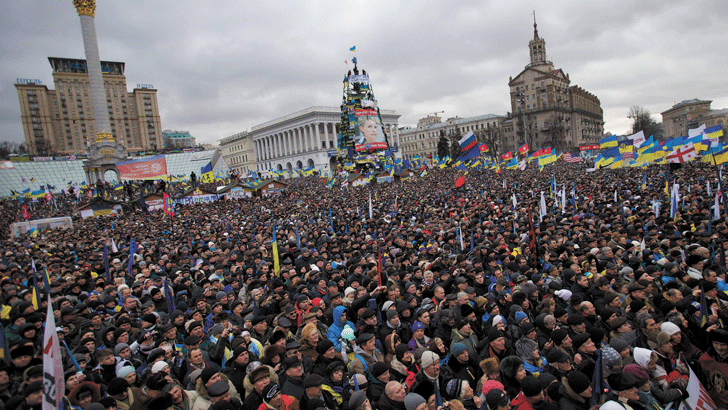Understanding Ukraine’s upheaval

Ever since the economic crisis broke out, and with it austerity and instability, upheavals and revolutions have flared up from one end of the world to another.
They have been shaped by local circumstances, politics and history. But running through each of them – the Arab Revolutions, the Occupy movement, the anti-austerity fights in Europe, the rebellions in Turkey and Brazil, the mass strikes in Indonesia – is general disaffection and the political awakening of masses of people.
However, rebellions do not always adhere to clear class or political lines. In the case of Ukraine, historical limitations and imperialist intervention has made it particularly complicated.
The crisis was provoked when a section of Western-oriented Ukrainian oligarchs – obscenely rich parasites who routinely buy political parties and TV channels – decided to rebel against President Yanukovich and the Russia-oriented oligarchs who backed him.
Unwittingly, they provoked a genuinely popular movement from below that they tried their best to influence, but could not control. People demonstrated against entrenched corruption, rule by oligarchs, abysmal living standards, a brutal state machine and Russian control.
Yet a very low political and class consciousness, and the virtual absence of a sensible and sizable left, meant that right wing and fascist forces quickly rose to prominence. Yanukovich fled and the right wing opposition and oligarchs hastily organised a new regime, whose corruption and brutality is guaranteed. Naturally, the US and the EU immediately became best friends with it.
Imperialism
The trajectory of the movement and the fate of Ukraine have been profoundly changed by imperialism. Not just the imperialism of the West as some commentators think. The main problem is Russia.
Russian domination over Ukraine has a long history. The foggy hopes for European stability and prosperity in the minds of many protesters are a direct result of Russian domination. They rightly associate Russia with corruption, poverty and repression.
It is the main regional power that has consistently bullied and harassed Ukraine – for example by turning off natural gas supplies in the middle of winter in order to wring a more favourable treaty out of the Ukrainian government. Ukraine relies on Russia for 60-70 percent of its energy needs, and so Russia has used blatant economic blackmail time and again.
When Yanukovich fell, Russian troops moved into Crimea. It was a clear response by Putin to a situation that he found unacceptable – a Ukraine that might not be firmly in the Russian camp. It was also a useful gift to the new government in Kiev.
There is a long history of nationalist resistance to Russian occupation. The government can now more effectively whip up and appeal to nationalist sentiment in order to redirect any discontent in the mass movement that brought it to power.
Putin has tried to present the occupation of Crimea as self-determination, having suddenly rediscovered the concept after presumably misplacing it during the brutal suppression of the Chechen independence movement.
While Crimea was part of Russia until 1954, and has a majority Russian-speaking population, Putin’s motive is to use Crimea as a beachhead to try to exert political and psychological influence over more of Ukraine.
A referendum on Crimean independence will take place shortly – but how democratic can it be when Russian special forces are occupying government buildings, and non-Russian mass media has been suppressed?
There are 250,000 Crimean Tatars who will likely boycott the poll, and around half a million Ukrainians who will oppose it. But even the Russian speakers in Crimea – who were sceptical of both the pro-Europe Maidan movement and Ukrainian nationalism – hold reservations about Putin.
The establishment of Russian control over Crimea will likely lead to a protracted conflict, more instability and an unknown future. The Russian troops are needed to ensure that people vote the “right” way.
All this is the result of Russian imperialism being more confident to throw its weight around the region. Imperialist dynamics operate not only globally, but also regionally – state powers carving out their spheres of influence in a world of shifting strengths and allegiances.
The rise of China and its alliance with Russia has emboldened Putin to put pressure on Eastern Europe. While the US is shifting its focus to the Pacific, Russia has attempted to build its own networks of geopolitical influence, primarily through its strategic control of the gas and oil supply to Europe through the Eastern states, as well as economic trade blocs such as the Moscow-centred Customs Union.
The fact of the matter is that while the US and the EU would like to intervene in Ukraine, and indeed have given whatever support they could to the pro-Western oligarchs, they are not setting the agenda. Putin is. This is important to recognise if we are to understand the dynamics of the region, as well as its future directions.
And in the struggle between the parasites at the top for geopolitical influence and economic domination, the ordinary people of Ukraine, Russia, and the rest of Europe will always get the short stick.